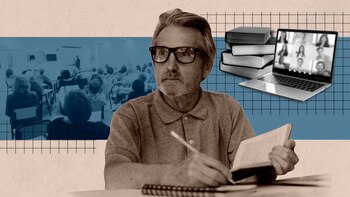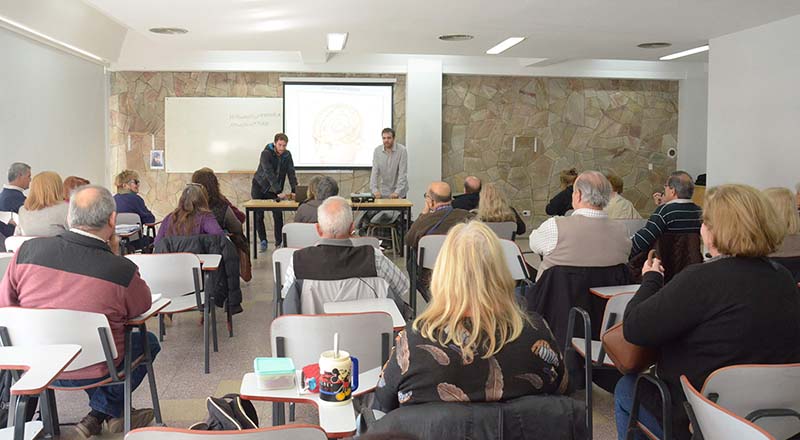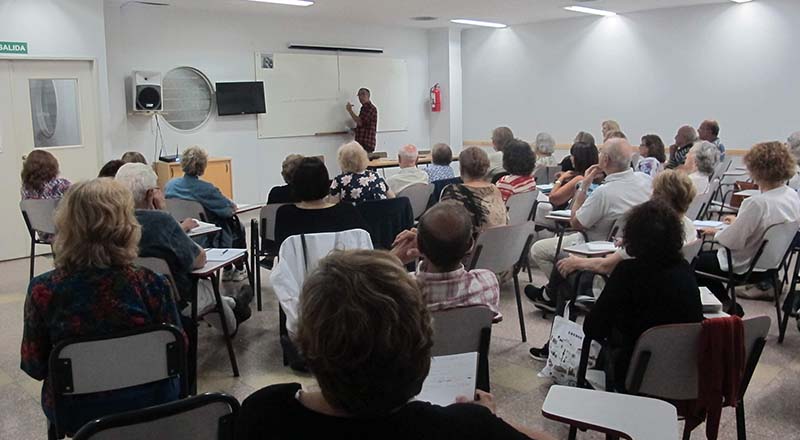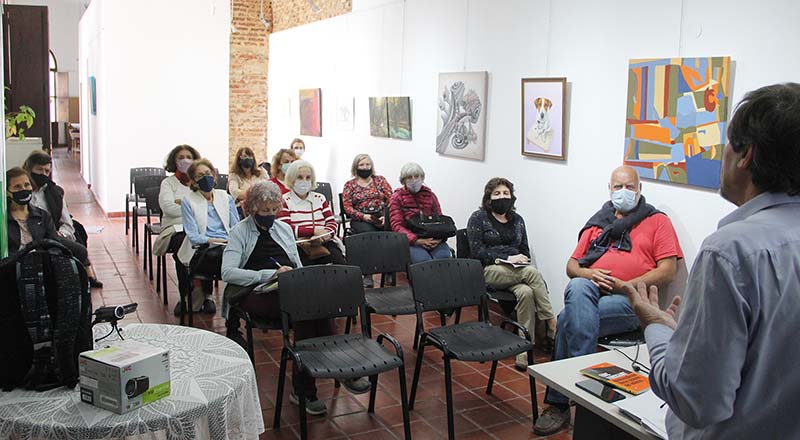
The Open University Program for Older Adults of the Universidad Nacional de Rosario (UNR) is a pedagogical, cultural, inclusive, free and academic quality proposal for the adult population that has already been a decade old, and is a benchmark among universities in Argentina. This month, it will open nine of the more than forty courses and workshops it has scheduled for this year, after overcoming the challenge of sustaining the link with a population heavily affected by the COVID-19 pandemic.
This program was born in 2011 on the premise that the university has a social mission and with the aim of establishing a systematic link with older adults. In the last two years, he has overcome the challenge of maintaining that link virtually, due to the restrictions imposed during the COVID-19 pandemic.
The courses are open to the entire community and the only requirement to register is to be over 50 years of age at the time of registration. In 2021, 3,194 people participated in 40 training proposals.

“We are convinced that the university must be open, in dialogue with the actors of its time and committed to them. One of the most important tools in this direction is the Senior Program, which has been consolidated in recent years. Today it is a central and strategic program of the university,” says Franco Bartolacci, rector of the UNR.
“The exchange that takes place is interesting, since people who have never gone through tertiary education, who are self-taught, even some who have not finished primary school and also participate professionals, graduates of our university,” says the coordinator of the program since its creation Elida Penecino, who also emphasizes the social role, in addition to the formative one, of this initiative: “At all stages of life it is important to be in contact with other people, from that contact new links arise, which is what also happens here”.
The rector of the UNR also highlights the program's contribution to the quality of life of the attendees: “It is a space for accompaniment, assistance, it generates instances of socialization and meeting. When you talk to those who attend, they value both the quality of the courses and what is generated in terms of social and human relations.”
Against old age
Robert Butler, a gerontologist and psychiatrist, coined in 1969 the term ageism, which can be translated as “ageism”, to refer to discrimination against older people. Later, Leopoldo Salvarezza, an Argentine physician, psychoanalyst and psychiatrist, proposed the word “old age”. He defined it as the prejudice related to people's age, which manifests itself in discriminatory attitudes, behaviors, practices and institutional policies directed against older adults.

“Ten years ago, I was very concerned about that attitude of contempt that is usually observed. I did a lot of work on this issue, in respect, the possibility of listening to each other between generations. The work we do as a university is very valuable,” Penecino says.
Prejudices such as “in old age there is nothing to do or that older adults only bother are falling out of academic knowledge,” he says. The program works on the enrichment of some capacities, such as those related to semantic memory and language, which are highly required in educational spaces.
On the UNR portal there is, for example, the testimony of Olga Ester López, who at the brink of 80 years received her diploma for having completed the History of Philosophy course and was one of the first graduates of the program. “We have been going through ancient, modern and contemporary philosophy. This program allows people who retire to continue living with an open window to the world,” he says. His goal was personal satisfaction: “For those of us who still have the mind with us, to be able to do so is to feel alive”.
The dream of the own building
According to the rector of the UNR, the program is a “very important device, to such an extent that year after year it becomes high”. In this regard, he emphasizes that efforts are being made to have a building of his own. “We are finally going to realize an old dream. The project is presented in the National Program for University Infrastructure. It will be an investment of 250 million pesos and we already have the confirmation of the national government”, adds Bartolacci.
“The program is not exhausted by the expectation or desire to have training in a specific subject, that is just the starting point of something much richer. Those who sign up generally remain”, he emphasizes. The consolidation of the program, he says, is “a necessary action” in the transition to an open-door university, which “ceases to be a palace of closed knowledge”.

Officially launched on October 19, 2011 at the Teatro el Círculo, the program was an initiative of rector Darío Maiorana, who assumed his second term that year. It began with twelve one-term courses, in which 500 people enrolled. A year later, the number of attendees had tripled.
Penecino recalls the immediate acceptance of the proposal and the rapprochement of the media, since there was a great demand from the age group it targets. “While some schools offered courses for the community, such as the case of Humanities, in this case it was a matter of thinking more broadly about how to get people over 50 to return to university and others to attend for the first time in their lives,” he says.
The challenge of virtuality
With the arrival of the COVID-19 pandemic, the Secretariat for University Extension proposed to do virtual courses. “It was quite a rush in that March 2020, although we were already encouraging students with new technologies, as a training space. The idea was to encourage them to discover the good things about technology,” says Penecino. The workshops accepted the proposal, some turned to family members, neighbors or university staff for help in technical matters. The group of teachers quickly accepted the virtual mode.
“In ten days we started teaching the courses and another world appeared, people from different provinces, others who lived in Europe and many people from southern Brazil who spoke our language. It was a captivating experience,” Penecino defines. In 2020, the offer was smaller in terms of number of courses, but in some meetings up to 6,000 people were connected. In the midst of lockdown, it was a way to combine entertainment with knowledge.
“Beyond the disaster caused by the pandemic, from the program we were able to demonstrate that older adults could also change attitudes and behaviors. It was a new way of being connected, of not getting lost”, defines the coordinator.
Virtuality allowed borders to be broken. Now, says the rector of the UNR, “the challenge is to intelligently and creatively combine virtuality and face-to-face”.

The course offer
The offer of courses is diverse. They are taught by teachers and researchers from the UNR, in areas such as Music, Economics, History, Literature, Psychology, Architecture, Philosophy and Health.
Throughout March, nine will start. On Mondays there is the Playful Writing Club run by teachers Natalia Biancotto, Marina Maggi, Natalia López Gagliardo and Rocío Muiño Blanco. On Tuesdays, Everyday Looks. How to Tell What Surrounds Us Through the Lens, taught by Martín Toyé and Film Course Great Directors, with Gisela Mattioni. Wednesday's agenda includes courses and workshops Recent Argentine History. From Alfonsín to Macri, by Juan Manuel Nuñez; About Companies, with Liliana Patricia Díaz and Mauricio Velozo; Classics of Western Literature. Besieged by Eros: Inquiries of Love Feeling in Literature, by Ernesto Ghioldi and Gisela Mattioni and Financial Tools for Older Adults. Electronic Means of Payment in the New Normal, by José Ignacio Favale, Gisela Galassi and Juan Ignacio Traverso.
Professor Fernanda Fernández leads the Hunger for Love workshop and Eduardo Taleti and María Liz Mansilla the course Social Conflictividad: Argentina 1853-2001, both on Thursdays. On Fridays, the Todo Técnicas Project: Creative Processes between Art and Design takes place. Experimentation on Traditional and Contemporary Techniques in Art and Design, by María Carolina Montano.
During April, 32 more proposals will be opened and can be found on the website https://adultosmayores.unr.edu.ar.
___
This note is part of the Solutions for Latin America platform, an alliance between INFOBAE and RED/ACTION
Últimas Noticias
Debanhi Escobar: they secured the motel where she was found lifeless in a cistern
Members of the Specialized Prosecutor's Office in Nuevo León secured the Nueva Castilla Motel as part of the investigations into the case

The oldest person in the world died at the age of 119
Kane Tanaka lived in Japan. She was born six months earlier than George Orwell, the same year that the Wright brothers first flew, and Marie Curie became the first woman to win a Nobel Prize

Macabre find in CDMX: they left a body bagged and tied in a taxi
The body was left in the back seats of the car. It was covered with black bags and tied with industrial tape
The eagles of America will face Manchester City in a duel of legends. Here are the details
The top Mexican football champion will play a match with Pep Guardiola's squad in the Lone Star Cup

Why is it good to bring dogs out to know the world when they are puppies
A so-called protection against the spread of diseases threatens the integral development of dogs




